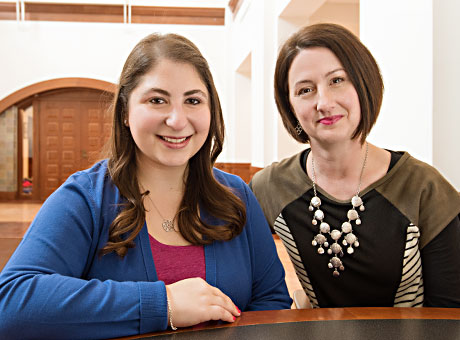
Alumna Melanie Paticoff, MSDE ’13, with her mentor Heather Hayes, PhD, director of deaf education studies in the Program in Audiology and Communication Sciences.

Alumna Melanie Paticoff, MSDE ’13, with her mentor Heather Hayes, PhD, director of deaf education studies in the Program in Audiology and Communication Sciences.
Today, as a result of newborn hearing screenings, advanced technologies and early intervention programs, more and more children with hearing loss are being mainstreamed into classrooms alongside hearing peers. With individualized support and assistive devices, such as cochlear implants, these children thrive academically. But, though they may excel in speech and listening, often, they feel socially isolated.
Alumna Melanie Paticoff is working to help them combat these feelings, providing a point of connection for kids and teens with hearing loss around the world. Last year, she launched Hearing Our Way, the only such magazine for children and teens. The goal: Bring hearing-impaired young people together through shared experiences.
Closing a gap
Growing up in Long Island, New York, Paticoff was inspired by her cousin Julie, now 19. As Paticoff explains, Julie listens to her iPod, attends concerts and is a member of a dance team. She also is profoundly deaf. Bilateral cochlear implants give her complete access to sound.
“There are 3 million other kids in the U.S. just like Julie and millions more around the world,” Paticoff said. “They attend school with their friends, join clubs and play sports, but they are usually the only ones with hearing loss in their entire school district.”
Often, these children haven’t spent any time in schools for the deaf and have had little exposure to other kids with hearing loss.
While pursuing degrees in deaf education, Paticoff witnessed a gap in social and emotional support for children with hearing loss. She noticed, for example, that children’s literature rarely depicts characters with hearing loss. This inspired her to write and self-publish two award-winning children’s books featuring Sophie, a fictional dog with a cochlear implant — “Sophie’s Tales: Learning to Listen” (2010) and “Sophie’s Tales: Overcoming Obstacles” (2012).
In 2011, Paticoff earned a bachelor’s degree in deaf education from Fontbonne University and, in 2013, a master’s degree from Washington University’s Program in Audiology and Communication Sciences (PACS), where she received the Max A. Goldstein Award for outstanding academic achievement and professional promise.
“Melanie was a special student from the very beginning,” said Paticoff’s mentor Heather Hayes, PhD, director of deaf education studies. “Her drive to help children who are deaf and who learn to listen and talk was unparalleled. It was my distinct pleasure to be one of her mentors, and I take great pride in it still.”
Reaching out
After graduating in May 2013, Paticoff began developing the magazine that summer. The first issue arrived in homes a year later, and a
successful crowdfunding campaign followed.
The quarterly magazine, which includes inspirational stories, language tips and tricks, self-advocacy skills and interviews with teens who have faced similar obstacles, is offered free.
“The magazine teaches kids and teens to celebrate their differences and provides vital social and emotional support to young people
during their formative years,” Paticoff said.
Filled with positivity and pop culture references, a recent issue contained song lyrics from the Jonas Brothers and advice on hairstyles that work well with cochlear implants.
Five thousand subscribers signed up in the first two months — with readers across the U.S. and as far away as Australia and Italy. Now,
there are 10,000 subscribers.
“Melanie is reaching out to children across the country (and the world) with her publication,” Hayes said. “Most importantly, she’s also reaching families, audiologists and physicians who might not even realize how valuable a magazine like this can be to young children and adolescents.
Just simply seeing images of children with devices like hearing aids and cochlear implants in a fun publication can mean the world to a child.
“Deafness is a low-incidence disability and, thus, many children and parents struggle to find common experiences with others.
“Additionally, Mel is bringing awareness to others about how children who are deaf can learn to listen and talk. This is invaluable.”
The partnership between the magazine and the medical school is still strong nearly two years post-graduation. PACS is a magazine sponsor, and every issue spotlights a current deaf education or audiology student at the medical school. A recent issue featuring a graduate student with hearing loss helped further illustrate that those with hearing impairment can go on to become audiologists, teachers or leaders in other fields.
Paticoff resides in St. Louis as editor-in-chief of Hearing Our Way and chief executive officer of Sophie’s Tales LLC.